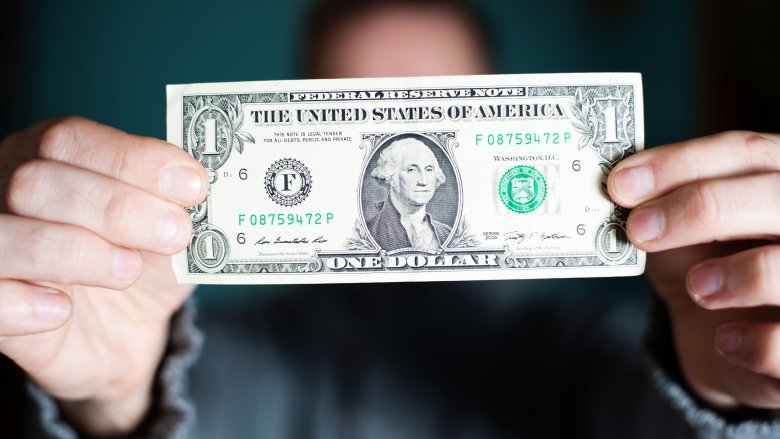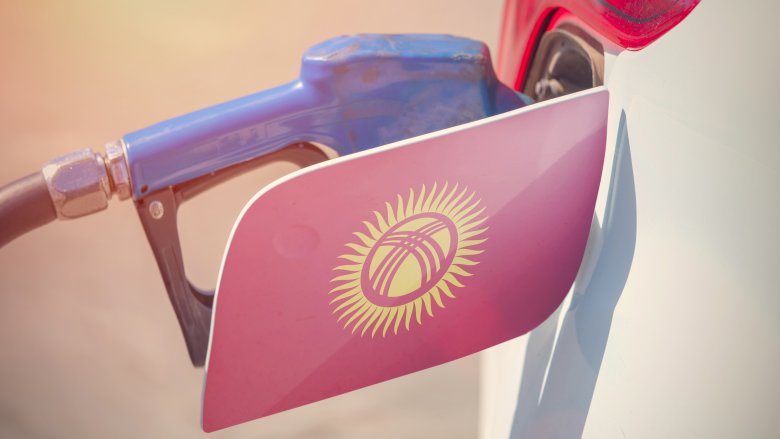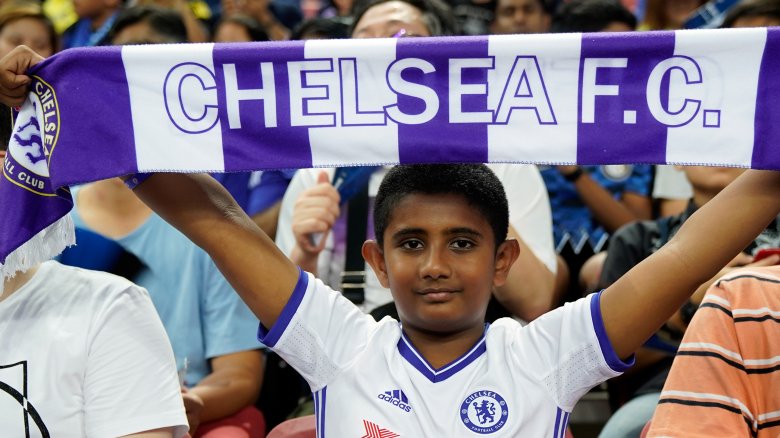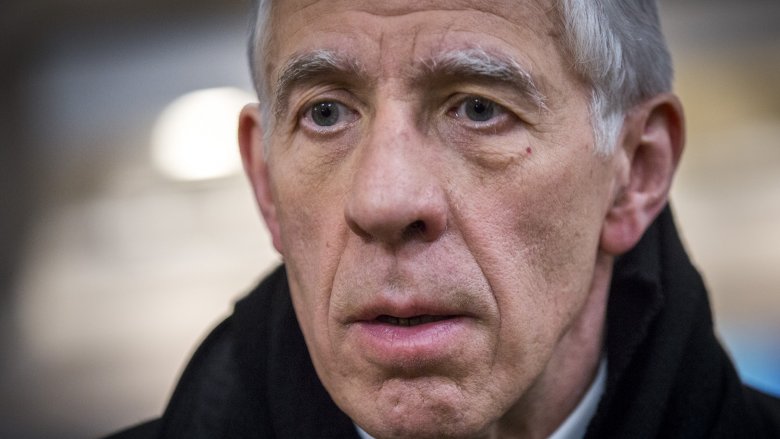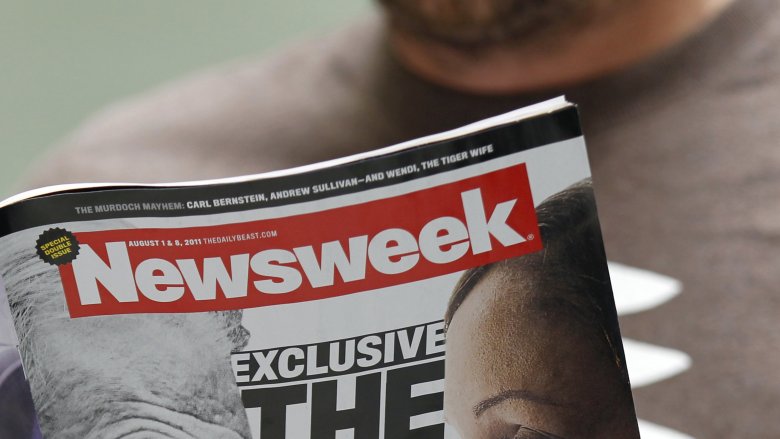Craziest Things That Only Cost A Dollar
A hundred years ago, one dollar was all your great-great-grandpa needed for a hard weekend's drinking, carousing, and hitting the sockless bare ankle bar across town. Fast-forward to today, and one dollar will get you, his descendant, a big fat pile of nothing. If you find a dollar on the street, realistically all you're gonna do is stick it in your pocket and forget about it until the next time you need to give the pizza guy a lousy tip.
Or are you? It turns out that, just occasionally, one dollar (or one pound, or one euro) really is enough to buy the cleverest or luckiest customer riches beyond their wildest dreams. If you ever find yourself at the exact right place, at the exact right time, with only a dollar to your name, you too might be able to snap up one of the following.
A historic house in sunny Italy (or rainy England)
Gangi, above, is the Italian town of your dreams. Set in the shadow of Sicily's Mount Etna, it's the sort of place Oscar-baiting films about rich city lawyers relearning the value of simple living could be set. The streets are cobbled, the buildings old, the locals stereotypical, and the sun always shining. It's perfection, and, in 2014, the local council decided to sell 20 of perfection's historic houses for one euro each, according to The Telegraph.
The houses all dated back centuries. Most were in an advanced state of disrepair, but seriously? A freakin' house in heaven costs a single euro and you're worried about the wear and tear?
Italy isn't the only country to try and make home buyers an offer they couldn't refuse. As the BBC reported, the less sunny U.K. city of Liverpool tried a similar trick in 2013, putting 20 Victorian houses on the market for a single pound each. The £1 homes proved so popular that the city put another 120 up for sale in 2015. Because Liverpool today apparently functions as a gigantic 99 cents store, in 2016 they also started selling shops for £1.
Before you sink your savings into flights to Liverpool or Gangi, you should know there's a catch. Buyers have to commit to repairing the homes or businesses, a process estimated to cost £60,000 ($79,354) in Liverpool. Business Insider told the story of one woman who visited Gangi and decided it would be cheaper to just buy a non-derelict home for the full price.
A vote in the life and fate of another human being
Mike Merrill is the guy who has turned abdication of personal responsibility into an art form. While the rest of us merely feel like our lives are at the mercy of fate's cruel whims, Merrill's genuinely is. In 2008, the then-30-year old Portland resident and entrepreneur needed to raise some capital. His get-rich-quick scheme? To turn himself into a publicly traded person, selling 100,000 shares in himself for $1 a piece. As Wired reported, he gave his new board voting rights over every aspect of his life. You can probably guess how that went.
Merrill's new shareholders ran him like a major company, voting on life decisions. At first, this was merely an irritation; share-owning friends voted for Merrill to spend less time with his girlfriend and more time with them. But then a couple of strangers from California found out about Merrill and bought huge amounts of shares. Things quickly went crazy.
At various times, Merrill's shareholders voted him into becoming a vegetarian, only sleeping four hours a day, registering as a Republican (Merrill is a Democrat), seeing less of his girlfriend, and, eventually, dating and attempting sex with another man (Merrill is straight). Like a character in a new Sims game powered solely by sadism, Merrill was forced into situations that could negatively affect his long-term outlook while netting short-term profits for his shareholders. The craziest part? Merrill never cashed out. He's still selling shares and letting shareholders make his life decisions.
The entire gas network of Kyrgyzstan
The Central Asian nation of Kyrgyzstan ain't a rich country. As the BBC detailed, it's a place of widespread poverty and ethnic tensions. But there's "not rich" and then there's "selling national assets off for less than the cost of a Taco Bell." In 2013, the Kyrgyz government in Bishkek did exactly that. It sold the entire gas network, including infrastructure, to the Russian government for one dollar (via Reuters).
The reason it was so cheap is probably related to the fact that Kyrgyzgaz was perhaps the most shambolic company on the face of the Earth. In the cold winter of 2012-13, the entire country's supply kept getting shut off over unpaid bills to Kazakhstan and Uzbekistan, triggering protests and discontent in the cities. Given that bloody revolutions have ousted two Kyrgyz presidents since 2005, the government was probably happy to get such a liability off its hands. If so, it chose an unfortunate buyer. Not three years later, in 2016, Eurasianet reported that the renamed Gazprom-Kyrgyzstan threatened to shut off service to the entire country in — you guessed it — a row over unpaid bills.
As always with stuff that costs $1, there was a catch. The Russian government-owned Gazprom had to agree to take on all of Kyrgyzgaz's debts, totaling $40 million, and promise to invest $609 million (20 billion roubles) over five years. Huh. Suddenly buying up an entire nation's gas network doesn't sound quite so straightforward.
The rights to the 'Terminator' franchise
There are few people on Earth who'd call James Cameron, the director behind mega hits like Titanic and Avatar, a bad businessman. He's world famous. His estimated net worth is $700 million (via Celebrity Net Worth). Regardless of the specifics, it's a lot. Way back in the early days of his career, James Cameron made a deal with Terminator producer Gale Ann Hurd that probably seemed genius at the time and painful in hindsight. The good news is that the deal allowed Cameron to direct The Terminator. The bad news is that he had to sell Hurd the rights to his franchise for $1.
At the time, Hurd was the driving force behind production company Hemdale, which brought you Platoon, The Last Emperor, and Return of the Living Dead. When the company hit the buffers in 1990, Hurd sold on the rights to The Terminator for $10 million, a level of investment return even the Monopoly Man would consider excessive.
As The Guardian detailed, subsequent sales have been equally impressive. Terminator rights went for $15 million in 1997, $25 million in 2007, and nearly $30 million in 2010. But wait! Maybe Cameron's even more shrewd than the world already gives him credit for. The Independent reported that the rights revert back to Cameron in 2019, at the exact same time two new, Cameron-produced Terminator films are due to hit cinemas — films that should send the value of the Terminator skyrocketing again. Well played, Mr. Cameron, sir. Well played.
One of Britain's top soccer teams
Very few soccer teams command worldwide recognition, but Chelsea FC is one of them. Frequent winners of various cups and shields fronted by impressive-sounding acronyms we don't even pretend to understand, Chelsea is a soccer giant. A whole lot of that is to do with a guy named Ken Bates. In 1982, Chelsea was a struggling club with its glory days in the rearview and debts to the tune of £1.5 million. Bates bought the whole lot for £1 (via the BBC) and set about turning it into a soccer powerhouse.
While this certainly sounds like the setup for a charming underdog movie, one probably made in the early 1990s starring John Candy, Bates himself wasn't as charming as it suggests. In fact, he was downright unsavory.
In 1967, he took his Oldham AFC club on a tour of Ian Smith's white supremacist Rhodesia, according to the U.K. government's National Archives blog. The year before, Smith had illegally declared independence from Britain to avoid the end of white minority rule, triggering a brutal race war. People were so concerned with Bates visiting this pariah state that questions were asked in the U.K. Parliament.
On the other hand, as the BBC explained, Bates did succeed in turning Chelsea around and later selling his £1 investment for £140 million. Life sure is a roller coaster, huh?
A 13th-century German castle
OK, this is getting silly. An actual German castle, for one euro? German castles are basically the standard for medieval beauty. Schloss Neuschwanstein (pictured) in Bavaria, as its official website is uber-keen to point out, inspired Walt Disney's Magic Kingdom. And you're saying similar wonderlands can be bought for €1?
If you're Helga van Horn, they can. As the Financial Times reported, in 2014 the Reno-based travel agent managed to secure a 13th-century castle outside Leipzig for the sort of small change most of us lose down the back of the sofa. Disappointingly, she didn't immediately start jousting and throwing banquets. Instead, she turned it into a business, using it as a kind of show home for other Americans looking to get their paws on a discount castle.
Yeah, that's right. Unusually cheap though Horn's Leipzig retreat was, it's not the only cheap castle in Germany. In its 2016 report, Financial Times noted there were between 50 and 100 castles for sale in Germany. Plenty of them were going for a song.
For this, you can thank that staunch friend of stately home ownership, communism. In the former East Germany, castles were confiscated by the state. When the Berlin Wall came down, that meant a bunch of ownerless castles, all ready to be sold for knock-down prices. Nearly 20 years later, some are still going cheap. Mostly they're cheap for castles rather than plain cheap, such as the 32-room neo-Renaissance pile going for €435,000, but still.
A year's employment as a U.N. goodwill ambassador
It sounds like the sort of employment contract a morally bankrupt Dickens character might dream up. You get a year's work from a celebrity, and in return, they get the princely sum of $1. These aren't bargain bin celebs, either, like Snooki or any of the Kardashians. They're people like Emma Watson and David Beckham.
Before you rush off to finalize that Harry Potter and the Sorcerer's Soccer Ball screenplay you've been working on, you should probably hear about the catch. There's only one organization in the world that can command talent like this for a sum like that, and it just happens to go by the name of the United Nations.
The U.N. has many roles. The biggest is to act as the fall guy for internet conspiracy theories. A smaller, but still vital, role is to act as a kind of global charity, using subsidiaries like Unicef and U.N. Women to promote not being cruddy to one another. As part of this, it hires people like Beckham to promote its work, sort of like how Nespresso hired George Clooney to promote its coffee maker, only with everyone's dignity still intact at the end of it.
The difference is that, while Clooney now sleeps on a pile of coffee-stained money, the U.N., as the SAGE Handbook of Human Rights explains, limits its celebrities' salaries to $1 per year. That's over a century of hard fundraising before you can even afford one of Clooney's overpriced coffee makers.
Silence on your human rights abuses
It sounds like the worst miscarriage of justice in history. An innocent man is kidnapped, taken away from his family, tortured, dumped in a vermin-infested prison for six years, and left to rot. For half of one of those years, his pregnant wife is tortured alongside him. At the end of it all, he's offered one measly pound as compensation ... on the condition he drops his case and all claims of human rights abuses.
Sickening, huh? Well, there's a twist. The man in question is Abdul Hakim (sometimes rendered as Abdelhakim) Belhadj, an ex-dissident from Libya who was abducted from Malaysia and dumped in Gaddafi's prison system by British spy agency MI6. He's now suing the U.K. government for kidnapping him and leaving him to be tortured, but as Al-Jazeera reported, he's willing to drop his case in return for a public apology, and symbolic compensation of £1.
The kidnapping came to light after the fall of Gaddafi. Rebels in Tripoli found a fax from the then-head of counterterrorism at MI6, Sir Mark Allen, taking credit for the extraordinary rendition of Belhadj (via The Guardian). By then, Belhadj was head of the U.K.-backed rebel government of Libya, which presumably made diplomatic meetings slightly awkward. Belhadj sued the U.K., Allen, and former Foreign Secretary Jack Straw (pictured above), in a case that's still ongoing. As advocacy lawyer Cori Crider notes in the Al-Jazeera report, fighting the case has so far cost London several hundred thousand times the £1 Belhadj originally wanted.
Newsweek, for less than the cost of an issue of Newsweek
Newsweek is one of America's iconic magazine brands. First published in February 1933, its red banner, bold white text, and celebrity-heavy covers are up there with Time and MAD Magazine in terms of brand awareness. Given the oft-repeated mantra "there's no such thing as bad publicity," you might expect such a household name to command megabucks. Well, it doesn't. In 2010, parent company Washington Post sold Newsweek on to the Daily Beast. Care to guess how much Daily Beast paid for it?
Yeah, that's right. A single dollar. This is especially crazy as, at the time, a copy of Newsweek cost nearly six bucks. That's right. The company was worth barely a sixth of a single copy of its own product (via the New York Times).
The Washington Post Company had held the rights to Newsweek since 1961. It was once considered a huge asset, almost up there with the name of the Washington Post itself. By 2010, though, the Post Company couldn't wait to get rid of it. And the company didn't just sell Newsweek for a single dollar — it actually sucked up costly penalties to get rid of it. Customarily, big titles sold for symbolic amounts come with guarantees that the new owners will take on existing debts and pensions. In this case, the Washington Post Company agreed to cover $10 million of Newsweek's bills and hold onto pension liabilities. That's less a fire sale and more financial self-immolation.
